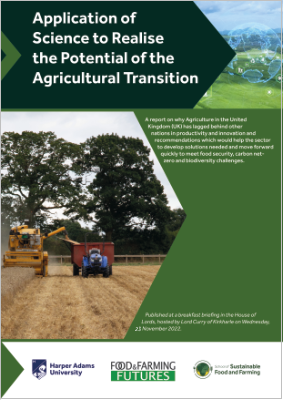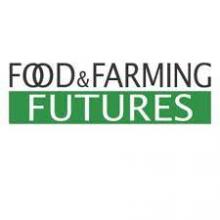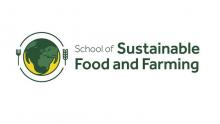Executive Summary
The objective of the Application of Science to Realise the Potential of the Agricultural Transition working group was to explore why the UK has lagged behind other nations in productivity and innovation. The group concluded that a key factor is fragmentation at all stages in the delivery of scientific knowledge which is impacting the sector’s ability to advance agricultural production, achieve carbon net-zero and enhance other sustainability parameters (e.g. biodiversity, animal welfare, ‘rural levelling-up’). This document is a synthesis of the group’s discussions intended primarily for an audience of UK policy makers and agricultural leaders.
A summary of the recommendations:
1) Food security should be considered by the UK government as a public good and included in the criteria for funding under the “public money for public goods” approach.
2) Additional Government funding should be allocated to agricultural extension and the delivery of scientific knowledge. This is justified because UK carbon net-zero goals are designed for the public good, due to the urgency imposed by climate change, the biodiversity crisis and food security.
3) To achieve food security, carbon net-zero and biodiversity goals, the agricultural sector must attract talent from throughout UK society.
4) Universities with strong local and regional agricultural interests should consider making farm level extension an explicit part of the job description and evaluation of some academic staff.
5) While in-person, facilitated peer-to-peer events at monitor/demonstration farms should continue to be an important part of the extension effort, the tools of interactive electronic communication should also be harnessed to help farmers in developing their knowledge.
6) National co-ordination of demonstration farms throughout the UK should be encouraged. These farms are currently managed within the ecosystems of various agricultural innovation and technology organisations.
7) The Government review of the Agri Tech Centres should consider establishing a single management structure to build on their shared vision, improve cross-sector working, achieve greater efficiencies and influence.
8) Government should establish a “What Works Centre” to streamline the evaluation and dissemination of agri-food research. To reduce fragmentation of the agricultural research and extension system, the centre should use a joinedup approach to coordinate closely with all parts of the UK agricultural research and extension system.
9) Agricultural research funding should include stronger support for collaborative, problemsolving science and extension requirements. These requirements could be fulfilled by the research funding recipient or partner organisations.
Conclusion
The UK agri-food sector is facing unparalleled challenges created by the confluence of climate change, food security concerns, and the farm policy/trade changes linked to Brexit. To respond to these challenges UK farmers and agribusinesses need access to the latest science and technology, but evidence shows that the UK lags behind comparable highincome countries in effective agricultural technology use. The recommendations from this working group are intended to speed technology development and adoption by reducing fragmentation and increasing coordination of extension organisations. Without these changes the UK agri-food sector will continue to lag behind on agricultural productivity and innovation.






